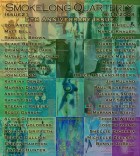You guest edited issue 15, then joined the staff for issues 16 and 17. What do you, as an editor, look for in a story? What about your own story, “The Folk Singer Dreams of Time Machines,” fits this criterion?
Looking back on Issue 15, I’m struck again by the number of stories with fabulist or magical realist qualities. In many ways, these are stories written by writers making their own myths, either through whole stories (like Joanne Comito’s “Moth” or Catherine Zeidler’s “Before, He Felt Like the Fat One”) or using characters who create their own world inside ours. Daniel Quinn wrote in one of his books about the lack of geographical space to escape to, how because every inch of the world is claimed by someone, our only hope is to carve out new cultural spaces where we can live the kind of lives we want to. I love characters who do this, who live their own myths, who create a life they could actually live out of the ruins they’re offered by their families and friends and communities. The issue is full of otherwise realistic stories only with extreme responses to emotions: to twisted love (Elizabeth Ellen’s “8×10”), to overpowering grief (Fred Spear’s “Copenhagen”), to a failure to fit in (Aaron Burch’s “Untitled (Gum).”
What I’m trying to say is that as an editor, I wanted to publish not only the kind of stories I loved to read, but also the kind that emboldened me as a writer, that challenged my conception of what characters could do in a story. The stories I’ve mentioned above are great to read, but they are also great inspirations for me and the kind of work I’d like to create.
I think the protagonist in “The Folk Singer Dreams of Time Machines” would fit in with the characters in the stories I’ve mentioned above just fine. Off stage, he is unsure about everything in his life. Surrounded by friends, he feels inadequate, like an imposter waiting to be discovered. He is afraid of sex, of the human body, of both the distances that separate people and the terrifying closeness of two people together. Despite these uncertainties, despite all the pain he senses everywhere, he is constantly trying to make something beautiful, trying to tell people he loves them even though he is unsure of himself. Maybe he even loves them more because of his uncertainties. It’s a dangerous thing to make beauty from ugliness, to stake your heart on the fragile bodies and souls of other human beings. A good song, for three minutes it can be the most beautiful thing in the world, can say something mere words might not be able to. Maybe, in that way, it’s better to a musician than a lover. Better a writer than a human being. It’s all about inventing a kind of myth, a way to explain who you are and why you are here, and also your relationship to the people around you.
If I had to choose a passage from this story that best described what I thought this story was about, I’d choose this one: “When he closes his eyes at night, everything he sees is dynamite and mustard gas and time machines he wants to build for saving little girls lost in foreign wars. He wants to write music to gather these people up and keep them safe. Songs like bomb shelters, like air raid drills, like preparations for tragedies.” What would you choose and why?
I think that’s a pretty good choice, although that sentence wasn’t in my head when I started, and came out pretty much exactly as it is in the final version. Looking at the story now, it does feel close to the heart of the character.
This story is a chapter from my novel-in-progress, which has as one of its starting points Neutral Milk Hotel’s second album, In The Aeroplane Over The Sea. The band’s singer, Jeff Mangum, is the inspiration for the folk singer character in my novel, although I wouldn’t presume to think that my character is in any way accurate to his own person. Nor would I want him to be, although I will say that the above line is definitely part of my interpretation of his music in general and of Aeroplane in particular.
Among other things, the album is partly a love song to Anne Frank, which maybe sounds weird but is actually pretty stunning. Some of the above comes directly from the songs I’ve been inspired by: In “Oh Comely,” for instance, Mangum writes “I know they buried her body with others/ her sister and mother and 500 families/ I wished I could save her in some sort of time machine.” The album is such an honest statement: a hip twenty-something musician admitting how deeply reading The Diary of a Young Girl destroyed him emotionally. My goal is to translate my own emotions onto the page as directly as he does on that album. I hope that by the time I finish this book, I’ll have at least come close.
“He sees his own body as a metaphor and everyone else’s as occupied territory.” Wow! Can I ask for the author’s interpretation?
Again, this is partly an interpretation of In The Aeroplane Over The Sea and partly my own character’s reaction. On Aeroplane, the characters’ pre-teen, inexperienced desires outpace their understanding of sex, leading to inappropriate, almost nonsensical images (“semen stains the mountaintops”) and human touches that aren’t exactly pleasant to imagine (“I would push my fingers through/ Your mouth to make those muscles move/ That made your voice so smooth and sweet”). From my own experience, there’s also a part of our lives where we see bodies as pure objects, especially with people we’re not close to. We want their bodies, to possess, to control, to do things to and to have things done to us by. It’s only later that we (hopefully) learn that we can share our bodies in a less conquest-oriented way. My singer, despite being in his twenties by now, doesn’t quite understand that still.
You live in Ann Arbor, Michigan, which is home to many literary journals (Hobart and Orchid, for example), the small press Dzanc Books, and, it seems, countless talented writers. So, is Ann Arbor the literary hub of the mid-west, or what?
I don’t think anyone here would describe us as a “literary hub” of anything, but Ann Arbor does have a great literary presence. It’s the home of the journals you mentioned, plus we’re lucky to have the editors of Detroit’s Absinthe and the internet’s Dogzplot join us here in town frequently. The best part about the literary scene here is that it’s very low-key, very friendly. There are independent readings at Shaman Drum and Crazy Wisdom almost every week, as well as frequent events at the Border’s downtown involving more established writers. I’m lucky to work with and be friends with a great group of people here, including Aaron Burch, Elizabeth Ellen, Barry Graham (my novel writing compatriots), Dan Wickett, Steven Gillis, Anna Clark, Stefan and Sanaz Kiesbye, Dwayne and Jessica Hayes, and I’m sure a bunch of people I should be mentioning. It’s not just Ann Arbor, either. My good friends and writing partners Josh Maday and Jeff Vande Zande are close by in Saginaw and Midland, and NewPages, where I’m the Book Review Editor, is headquartered in Bay City. Those are just the people I’m involved with, so there’s obviously lots of other people doing good work in the area as well.
I’m incredibly lucky to be surrounded by such talented and driven colleagues, and getting to know the people here in Ann Arbor has been a highlight of my first year living here.
This issue marks SmokeLong’s fifth anniversary, which has me thinking about longevity and growth. There’s no denying the literary arena is a fickle one, with journals coming and going, writers shooting onto the scene then falling into a long hiatus, editors changing houses, agents merging, and the trends! Don’t even get me started! How do you, as a writer, endure the ups and downs? Have you experienced any setbacks? What measures have you taken to grow?
First, let me just congratulate SmokeLong on its anniversary, and pass along my wishes to be here for the tenth and twentieth and so on. As long as Dave’s along to lead the way there will always be a great supporting staff of editors here to help him put this great magazine together, and I couldn’t imagine my own reading life without it. I was a reader of SmokeLong long before I was a contributor and an editor, and even after leaving the magazine I still find every new issue to be an important and exciting event.
As for myself, I’m generally optimistic about my writing and the place I’m at in my career. I’m really just starting out, and I’m in no hurry. I recently told someone that in two years, when I leave grad school, I want to have this novel and a short story collection ready to be sent out. So I’ve got a lot of work to do, but a lot of time to do it too.
The biggest setbacks I’ve had are of my own making. I got into a funk last year where I barely wrote at all, and I couldn’t get myself out of it. In all of 2007, I only finished one short story, and I never sent it out or showed it to anyone. I got so frustrated that I was having trouble even reading—I just didn’t want to do it, and I got mad at myself for feeling that way, which made it worse. I wish I could say exactly what the difference has been this year, but I’m back on track and working hard. I’m busier than I’ve ever been, between my own writing, NewPages, my day job, and of course my friends and family, so I’m forced to make the most out of my writing time. For the first time in my life, I write according to a schedule (five days a week, two hours and one thousand words a day, at least), which has been a huge boost to both the quantity and quality of my work. I’m very happy to have turned things around, and I’m going to do my best to make sure I never get that discouraged again.
Most of the steps I’ve taken to grow involving learning to be more disciplined, to have ever higher standards for myself, and also to be sure that I’m always having fun while I’m writing. It’s a job, but it’s also a joy. Most importantly, I’ve recently realized that I’ve transitioned mentally to seeing myself primarily as a writer, instead of as a “student who writes” or a “bartender who writes” or whatever. It’s amazing what deciding that did for my mental state, and for the importance I placed on my own day-to-day-work. I read once that in America, a man is defined by his job. I don’t know if I exactly agree with that, but I like the idea that I can use it to my advantage: That if I decide that I am a writer, then that’s what I am. Good enough for me.
Thanks again for including me in this special, and for taking the time to put together this great interview. I’m truly honored to be a part of SmokeLong again.


